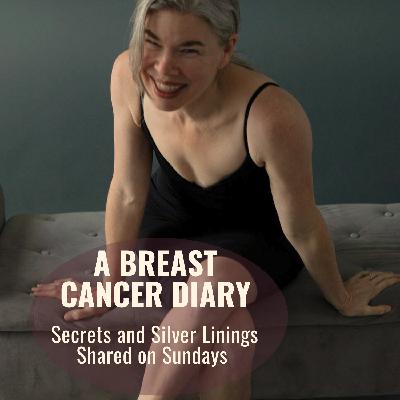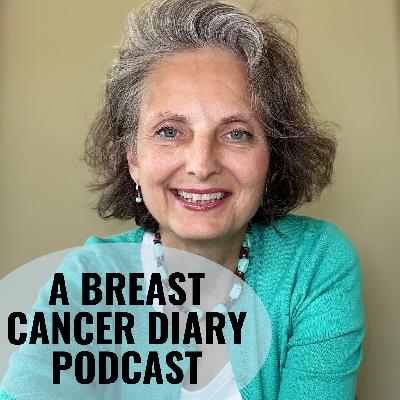Breast Surgeons, Flat Denial and BRCA2
Description
The topic of breast surgery and skin conserving surgery has been a real trigger for me in the past since my first plastic surgeon kept refusing to take the extra skin off of my chest as I requested. The fact that I could talk to Lisa about this without getting emotionally worked up was one good sign--and then I had two other chances to talk publicly about my flat denial story in the past month as well. When it rains it pours!
Transcript:
Happy New Year and welcome to season two of A Breast Cancer Diary podcast. Last week, I aired my first episode of season two with Lisa Sylvester, founder of the project Still.Me or “STILL project.” She is just now coming out with her new book or two different books, actually the compendium and the anthology of her photography and storytelling project, called "Project Still Me". And the website is project-still.me if you want to look it up, um, it's now available for sale. So on the day of the last podcast episode airing, it was the day before it was available for sale. So if you heard that podcast right away as it aired, you may have been too early to purchase her two different books.
So just want to remind you to go back and do that now if you intended to, those books are ideally for the eyes of patients and surgeons, and we talked a lot about the idea of reaching out to surgeons to help them to understand the second half of the story, the half of our lives that happens after we interact with them.
Uh, a lot of breast cancer survivors have different things that happen, um, whether they explant or go on to really appreciate their new bodies. Their surgeons don't always get to hear about it. So Lisa's mission in this project, which was an amazingly ambitious and talent filled project of mostly photography and, publishing and graphic design,.
This is meant for the eyes of surgeons, especially, and hopefully, we can all come together to partner with these surgeons of ours to get it out in the world and allow them to use it as a tool in their consult rooms prior to surgery. And all of the women in the STILL anthology are, flat. They went flat either after having implants or just straight to flat after a mastectomy.
And so it's just another alternative to the very, strongly pushed option of, of having implants. That's so common right now. Lisa has been working with Kim Bowles from Not Putting on a Shirt and getting connected to a very special conference coming up this spring called ASBRS. It is a special conference that is just for surgeons.
At this time, unlike some of the other breast cancer conferences, They don't allow advocates into this conference, so there's not an open door for advocates or patient advocates, um, to come in and have a voice. So, unfortunately, we flatties won't be able to attend that conference unless we're doctors, um, especially surgeons.
I think, even if you were a doctor and not a surgeon, you probably wouldn't attend that conference. But it is in Vegas this spring, and the hope is that surgeons will be at least open to the idea and will see some of the images in large scale format. Um, they're going to have them in big posters at the conference so that they're hard to miss.
They don't have to walk up to a booth or a table to look at the book. They'll have, they'll see the posters in large scale format and hopefully some surgeons, um, some of them already are big fans of going flat. They can appreciate going flat, but a lot of surgeons are really pushing implants, and there's this kind of common narrative that's going around.
I'm not sure where it started, but, um, there's a belief among surgeons that women are way more, mentally well in the long run if they have implants because their bodies look more like their natural bodies or, the bodies that they had prior to mastectomy. And that is, A really great assumption. I mean, it's a natural assumption that I would agree with if I hadn't been through this, um, and talked to so many women with implants, many women with implants are very, very happy with their implants, but
many women with implants are not and the truth is that many and most of us who are flat are very happy with our new flat bodies. And I actually had a chance to testify to that in person, um, with my knees knocking at the big breast cancer global gathering in San Antonio this last month in December. I wasn't planning to take the mic and talk to a room full of surgeons, but I just happened to stumble into, um, a talk, uh, about a couple of different studies and I didn't realize going in that the studies were about this topic of mental wellness post mastectomy and, with skin sparing and tissue sparing mastectomies being preferable for women's wellness and mental health as the argument.
And I haven't looked at the details or the methods of the two studies mentioned. They were studies out of Japan and the UK, but the outcome of those two studies was arguing for saving as much breast tissue and skin as possible for the sake of, of long term mental health and wellness of women patients.
And that kind of, you know, triggered me a little bit and made me wonder if those studies were well administered or if they were asking leading questions, which, you know, those kinds of studies almost are guaranteed to be doing. If you agree to do that kind of study, you're kind of going in with the expectation that you're going to want to praise your personal doctors who've saved your life and saved you from breast cancer instead of criticizing them and the work that they're doing.
So, It's really hard to be objective as a patient in that kind of study. It's a questionnaire based study, usually, and it's not done personally. It's not done within the context of community, which is where a lot of our body image healing happens in the context of community. But if you're doing a little survey and you're isolated and alone and you haven't had conversations with other survivors about body image issues, then you may not have even broached the question before.
So it's a much deeper issue than what these surgeons were, um, you know, optimistically thinking. And the sweet, sweet man who was presenting the data was just so well intentioned, I couldn't possibly be critical of him. I did wanna tell the other side of the story because he was really arguing for pressing women to save as much breast, tissue and skin as they possibly could.
And so many women do not want to save their breast tissue, number one, because they don't want to fear their cancer coming back in that breast tissue, which is a legitimate fear. Um. And so I got up to the mic and said, I am just one person, but I'm very happy with my flat body.
And I want to tell you that there are a lot of us who are pleased after going flat. There's a lot less anxiety, a lot less fear of recurrence, whether that's legitimate and rational and based on data or not. It's true. And without any breast tissue, I feel lighter and more comfortable in the world. And I.
didn't take long to get used to my body and I'm heterosexual, female presenting, married to a man who is male presenting. And I'm very, very happy with this flat body of mine. And I had to fight for it because my surgeon wasn't willing to give it to me when I asked twice. And the third time I went to a new surgeon and got what I wanted, which was flatness.
And of course, you know, I was super nervous, shaking. I didn't want to stay in that room a minute longer than I had to. And the man that I was addressing was very gracious and kind in his response. His motto was, think twice, cut once. Meaning, think twice about taking that extra tissue and skin and then cut.
And I told him, I would like for you to think twice and ask once and cut once, but asking is really important. And that's something that was not truly done for me and so many of the women that I've talked to that have been denied flatness. So that was a big kind of marker in my life as an advocate and, activist. I was really uncomfortable the rest of the whole day, walking around knowing that some of the people in that dark ballroom that I had spoken up in, probably knew me where I hadn't looked at their faces.
And I felt really uncomfortable in one sense, but also very gratified. in another sense. And actually this last week I had another really amazing opportunity to speak up about my experience of flat denial with my former surgeon, not the plastic surgeon that denied me flatness. That would have been extremely intense.
And emotional for me, but the other surgeon who was in the room, my breast surgeon, who I think knew that I wanted to be flat both times. I'm not 100 percent sure that she knew that because most of my conversation about wanting to be left flat was with my plastic surgeon in a one on one consult with her.
So I wasn't really resentful towards this breast surgeon of mine. But I didn't know if I'd ever have a chance to talk to her in a clinical setting again. Unfortunately, I've had a little recurrent scare, and so I did have a chance to talk to her this last week. And I told her very clearly that I was very unhappy with the outcomes that I was left with on both of my first two surgeries with her and that plastic surgeon.
And I asked her if she still used that plastic surgeon, and she said she did. And so I pressed her to really think about it and I gave her some literature from Not Putting On A Shirt and Stand Tall AFC to point out to that surgeon in particular about how women who say they want to go flat really want to look, we want to look flat without any extra skin.
And so I was very direct with her and kind, and I think







